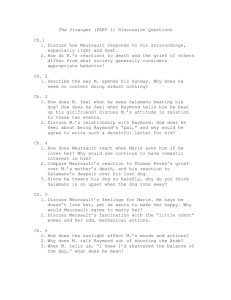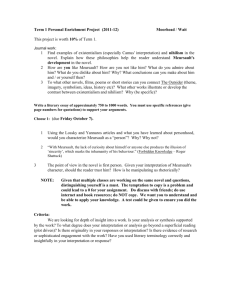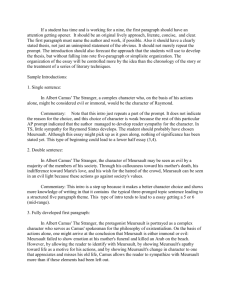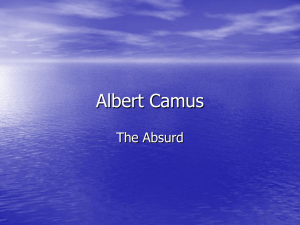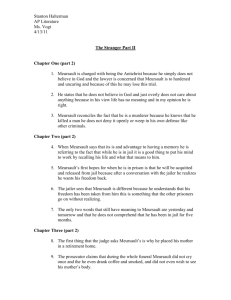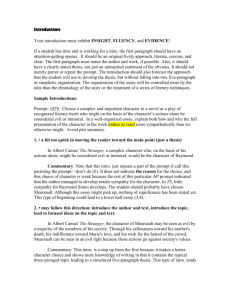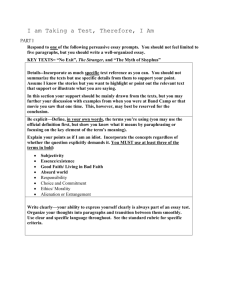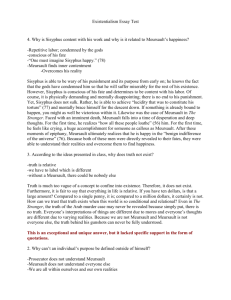THE STRANGER
advertisement
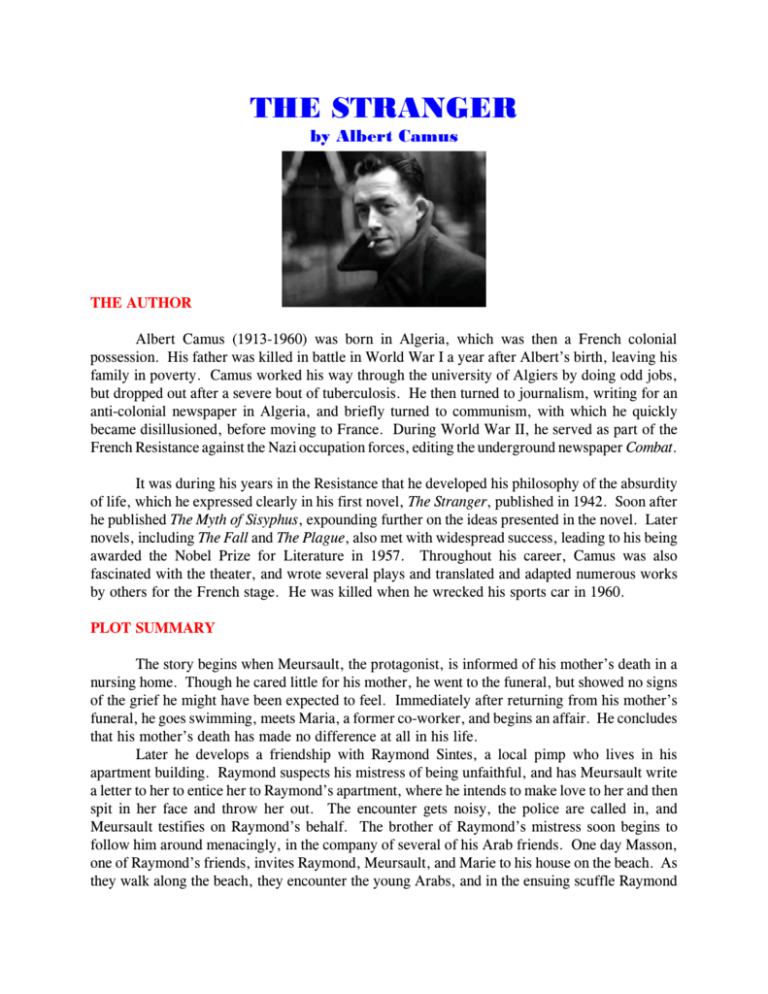
THE STRANGER by Albert Camus THE AUTHOR Albert Camus (1913-1960) was born in Algeria, which was then a French colonial possession. His father was killed in battle in World War I a year after Albert’s birth, leaving his family in poverty. Camus worked his way through the university of Algiers by doing odd jobs, but dropped out after a severe bout of tuberculosis. He then turned to journalism, writing for an anti-colonial newspaper in Algeria, and briefly turned to communism, with which he quickly became disillusioned, before moving to France. During World War II, he served as part of the French Resistance against the Nazi occupation forces, editing the underground newspaper Combat. It was during his years in the Resistance that he developed his philosophy of the absurdity of life, which he expressed clearly in his first novel, The Stranger, published in 1942. Soon after he published The Myth of Sisyphus, expounding further on the ideas presented in the novel. Later novels, including The Fall and The Plague, also met with widespread success, leading to his being awarded the Nobel Prize for Literature in 1957. Throughout his career, Camus was also fascinated with the theater, and wrote several plays and translated and adapted numerous works by others for the French stage. He was killed when he wrecked his sports car in 1960. PLOT SUMMARY The story begins when Meursault, the protagonist, is informed of his mother’s death in a nursing home. Though he cared little for his mother, he went to the funeral, but showed no signs of the grief he might have been expected to feel. Immediately after returning from his mother’s funeral, he goes swimming, meets Maria, a former co-worker, and begins an affair. He concludes that his mother’s death has made no difference at all in his life. Later he develops a friendship with Raymond Sintes, a local pimp who lives in his apartment building. Raymond suspects his mistress of being unfaithful, and has Meursault write a letter to her to entice her to Raymond’s apartment, where he intends to make love to her and then spit in her face and throw her out. The encounter gets noisy, the police are called in, and Meursault testifies on Raymond’s behalf. The brother of Raymond’s mistress soon begins to follow him around menacingly, in the company of several of his Arab friends. One day Masson, one of Raymond’s friends, invites Raymond, Meursault, and Marie to his house on the beach. As they walk along the beach, they encounter the young Arabs, and in the ensuing scuffle Raymond is injured. When they return to the house, Raymond threatens to use his pistol, which Meursault takes from him. Meursault then goes out on the beach alone, and soon encounters the brother of Raymond’s mistress, who is likewise alone. Bothered by the sun, Meursault shoots the Arab five times and kills him. Part II of the book deals with the aftermath of Meursault’s arrest. He is taken to prison, where a court-appointed lawyer is chosen to represent him. The judge tries to convince him to confess his sin and turn to God, but Meursault replies that he does not believe in God. Once the case goes to court, the judge, the attorneys, and the jury seek a rational explanation for what was really a senseless and motiveless crime. The prosecutor dwells at great length on Meursault’s cold and heartless response to his mother’s death, along with his atheism. Throughout the trial, the Arab is rarely mentioned (in truth, Arabs were frequently gunned down in the colonial era in Algeria, and nothing was usually done about it). Instead, Meursault is ostracized and condemned for not adhering to the norms of society - he didn’t mourn for his mother, he began an affair the next day after going to the movies and watching a comedy, he associated with low-lifes like Raymond and helped them in their criminal activities, and he disdained the God of the Christian Church. His friends testify on his behalf, but the prosecutor, judge, and jury conclude that such an anti-social person must be a “monster.” They condemn him to die on the guillotine. While in his cell awaiting execution, Meursault is visited by a priest, who tries to convert him. Meursault becomes angry, and pours out that philosophy of which he had only recently become conscious - that life has no meaning, and that joy comes from taking pleasure in the moment without the need for hope. The story ends with Meursault’s wish that a large crowd attend his execution and revile him with curses - then he will finally know that he has chosen freely, having rejected all the constraints of the sham society by which he is surrounded. MAJOR CHARACTERS • Meursault - The protagonist, an ordinary man holding down an ordinary job in an ordinary town in colonial Algeria. He is emotionally detached from those around him, feels nothing when his mother dies, becomes Raymond’s friend and Marie’s lover because he can’t think of any reason not to, and kills the Arab for no reason at all. His isolation from the society around him, rather than the murder he has committed, causes him to be condemned to death. • Marie Cardona - A former co-worker of Meursault’s who becomes his lover. Though Meursault says he does not love her, he agrees to marry her, though he admits it makes no difference to him. • Celeste - The proprietor of a café where Meursault often eats, he testifies on Meursault’s behalf during the trial, and elicits one of the few expressions of emotion found in the novel when Meursault confesses that, if he had ever wanted to kiss a man, that was the time. • Salamano - One of Meursault’s neighbors, he has a mangy dog that he walks every day at the same place and time. He repeatedly abuses the dog, but is inconsolable when it runs away. He speaks in Meursault’s behalf at the trial. • Raymond Sintes - Another one of Meursault’s neighbors, he is a pimp. He befriends Meursault and enlists his aid to wreak vengeance on his mistress, whom he suspects of cheating on him. After Raymond beats up his mistress, Meursault testifies on his behalf, but the girl’s brother begins to follow Raymond around. It is this young Arab whom Meursault murders on the beach. Raymond testifies for Meursault at the trial, but his shady reputation winds up doing more harm than good. • Masson - A friend of Raymond’s who invites Meursault and Marie to his beach house for the day; it is there that Meursault encounters and murders the Arab. • The Chaplain - The man responsible for meeting the spiritual needs of men in the prison, he tries to visit Meursault, but is repeatedly refused. Finally he enters unannounced to find out why the prisoner refuses to see him. Meursault becomes angry, and pours out his philosophy of life into the chaplain’s unwilling ears. • The Judge - He is deeply disturbed by Meursault’s lack of grief at his mother’s death, and seeks to direct him to the solace of Christianity. He brandishes a crucifix in Meursault’s face, but the accused denies any belief in God. NOTABLE QUOTATIONS “And just then it crossed my mind that one might fire, or not fire - and it would come to absolutely the same thing.” (Meursault, p.72) “Then everything began to reel before my eyes, a fiery gust came from the sea, while the sky cracked in two, from end to end, and a great sheet of flame poured down through the rift. Every nerve in my body was a steel spring, and my grip closed on the revolver. He trigger gave, and the smooth underbelly of the butt jogged in my palm. And so, with that crisp, whipcrack sound, it all began. I shook off my sweat and the clinging veil of light. I knew I’d shattered the balance of the day, the spacious calm of this beach on which I had been happy. But I fired four shots more into the inert body, on which they left no visible trace. And each successive shot was another loud, fateful rap on the door of my undoing.” (Meursault, p. 76) “That was unthinkable, he said; all men believe in God, even those who reject Him. Of this he was absolutely sure; if ever he came to doubt it, his life would lose all meaning.” (Meursault referring to the Judge, p.86) “Of course, I had to own that he was right; I didn’t feel much regret for what I’d done. Still, to my mind he overdid it, and I’d liked to have a chance of explaining to him, in a quite friendly, almost affectionate way, that I have never been able really to regret anything in all my life. I’ve always been far too much absorbed in the present moment, or the immediate future, to think back.” (Meursault, p. 126-127) “... [my father] had gone to see a murderer executed. The mere thought of it turned his stomach. But he’d seen it through and, on coming home, was violently sick. At the time, I found my father’s conduct rather disgusting. But now I understood; it was so natural. How had I failed to recognize that nothing was more important than an execution; that, viewed from one angle, it’s the only thing that can genuinely interest a man?” (Meursault, p. 138) [The priest, visiting Meursault in prison, insists that he must have wished that there was an afterlife.] “Of course I had, I told him. Everybody has that wish at times. But that had no more importance than wishing to be rich, or to swim very fast, or to have a better-shaped mouth. It was the same order of things.” (Meursault, p. 150) “Actually, I was sure of myself, sure about everything, far surer than he; sure of my present life and of the death that was coming. That, no doubt, was all I had; but at least that certainty was something I could get my teeth into - just as it had got its teeth into me. I’d been right, I was still right, I was always right. I’d passed my life in a certain way, and I might have passed it in a different way, if I’d felt like it. I’d acted thus, and I hadn’t acted otherwise; I hadn’t done x, whereas I had done y or z. And what did that mean? That, all the time, I’d been waiting for this present moment, for that dawn, tomorrow’s or another day’s, which was to justify me. Nothing, nothing had the least importance, and I knew quite well why. He, too, knew why. From the dark horizon of my future a sort of slow, persistent breeze had been blowing toward me, all my life long, from the years that were to come. And on its way that breeze had leveled out all the ideas that people tried to foist on me in the equally unreal years I was then living through. What difference could they make to me, the deaths of others, or a mother’s love, or his God; or the way a man decides to live, the fate he thinks he chooses, since one and the same fate was bound to “choose” not only me but thousands of millions of privileged people who, like him, called themselves my brothers.” (Meursault, p. 151-152) “And I, too, felt ready to start life over again. It was as if that great rush of anger had washed me clean, emptied me of hope, and, gazing up at the dark sky spangled with its signs and stars, for the first time, the first, I laid my heart open to the benign indifference of the universe. To feel it so like myself, indeed, so brotherly, made me realize that I’d been happy, and that I was happy still. For all to be accomplished, for me to feel less lonely, all that remained to hope was that on the day of my execution there should be a huge crowd of spectators and that they should greet me with howls of execration.” (Meursault, p. 154) ESSAY QUESTIONS Discuss the following in a five-paragraph essay: 1. Both Albert Camus’ The Stranger and Dostoevsky’s Crime and Punishment involve a murder and its consequences in the inner life of the perpetrator. Compare and contrast the impact of their murders on the inner lives of Meursault and Raskolnikov, and relate these consequences to the overall themes of the two works. 2. In speaking of his conversation with the Judge, Meursault says, “That was unthinkable, he said; all men believe in God, even those who reject Him. Of this he was absolutely sure; if ever he came to doubt it, his life would lose all meaning.” In what way is this statement an example of the use of irony, and how does it contribute to the overall message that Albert Camus is trying to communicate in The Stranger? 3. “For all to be accomplished, for me to feel less lonely, all that remained to hope was that on the day of my execution there should be a huge crowd of spectators and that they should greet me with howls of execration.” How does the closing sentence of Albert Camus’ The Stranger bring home the existentialist dictum that only that which is freely chosen may be seen as truly moral? 4. Throughout Albert Camus’ The Stranger, Meursault demonstrates no human emotion whatsoever, indicating his alienation from society. Only near the end of the book, when he becomes angry with the priest in his cell, does he demonstrate emotion. Does this display of emotion put an end to his alienation, or merely confirm it? 5. Albert Camus, when commenting on The Stranger, said that Meursault was “the only Christ we deserve.” In what sense did the protagonist of the story die for what he believed? How does the comparison reveal that Camus fell far short of understanding the true significance of the Atonement? 6. In Albert Camus’ The Stranger, Meursault is condemned to die, not for his act of murder, but for violating the standards of society. A rebel must of necessity flout society’s conventions, but he must also have a “higher” moral code to which he scrupulously adheres. Is Meursault a rebel in this sense of the word? 7. Discuss the following comment on Albert Camus’ The Stranger: “Meursault is a body without a soul. His pleasures and discomforts are purely tactile and sensory, with no admixture of emotion or spiritual awareness.” 8. At the end of Albert Camus’ The Stranger, Meursault speaks of himself in the following terms: “I laid my heart open to the benign indifference of the universe. To feel it so like myself, indeed, so brotherly, made me realize that I’d been happy, and that I was happy still.” In what sense does the protagonist serve as a symbol of the universe itself, and thus convey the author’s concept of the nature of reality? 9. Albert Camus once summarized Meursault’s character in simple terms: “Meursault doesn’t play the game .... he refuses to lie.” Is it really that simple? To what extent is it accurate to portray Camus’ existentialist hero as a man who refuses to participate in the sham and the pretensions of the society in which he lives? 10. Typical courtroom dramas are structured in such a way as to reassure the reader that truth will prevail. In Albert Camus’ The Stranger, however, the courtroom scene serves the purpose of indicating that any such reassurance is mere illusion, and that “truth” does not exist. How does Camus achieve this end? 11. In Albert Camus’ The Stranger, Meursault is a hedonist - he lives for pleasure, usually of the most sensual variety. Discuss the connection between the protagonist’s hedonism and the existential conclusions of the novel. Support your arguments with specifics from the book. 12. Compare the narrative styles used by the authors in Albert Camus’ The Stranger and Ernest Hemingway’s The Sun Also Rises. How are their styles similar? How are they different? How do the styles employed by the authors contribute to the themes of their novels? Be sure to cite specifics from the novels in building your arguments. 13. One of the central themes of Albert Camus’ The Stranger is alienation. Discuss some of the ways in which the author communicates the alienation of Meursault from the world around him. Be sure to include comments on plot, dialogue, style, and imagery in your discussion. 14. In the trial of Meursault in Albert Camus’ The Stranger, much is made of his actions at is mother’s funeral. Are these actions relevant to the crime for which he is being tried? Why or why not? Support your arguments with specifics from the novel. 15. Compare and contrast the picture of the meaninglessness of life found in Herman Melville’s Bartleby the Scrivener and Albert Camus’ The Stranger. Be sure to consider both the ways life is pictured in the stories and the solutions proposed by the authors, if any. 16. Compare and contrast Archibald MacLeish’s J.B. with Albert Camus’ The Stranger. To what extent do they communicate the same message about the meaning of life, and in what ways do their views differ? 17. At one point in Albert Camus’ The Plague, one of the characters alludes to the incident that serves as the central plot point of The Stranger. Compare and contrast the two Camus novels, both in terms of their expositions of Existentialism and in their views of the human condition. Do you see any evidence that the author’s perspective changed during the five or six years between the writing of the two books? 18. Compare and contrast the final conversation between the priest and the lieutenant in Graham Greene’s The Power and the Glory and that between Meursault and the Judge in Albert Camus’ The Stranger. Both dialogues deal with serious religious questions, though the sides taken by the participants differ in the two novels. Be sure to deal with the central ideas about the truth of Christianity that the authors are seeking to convey through the two conversations.
